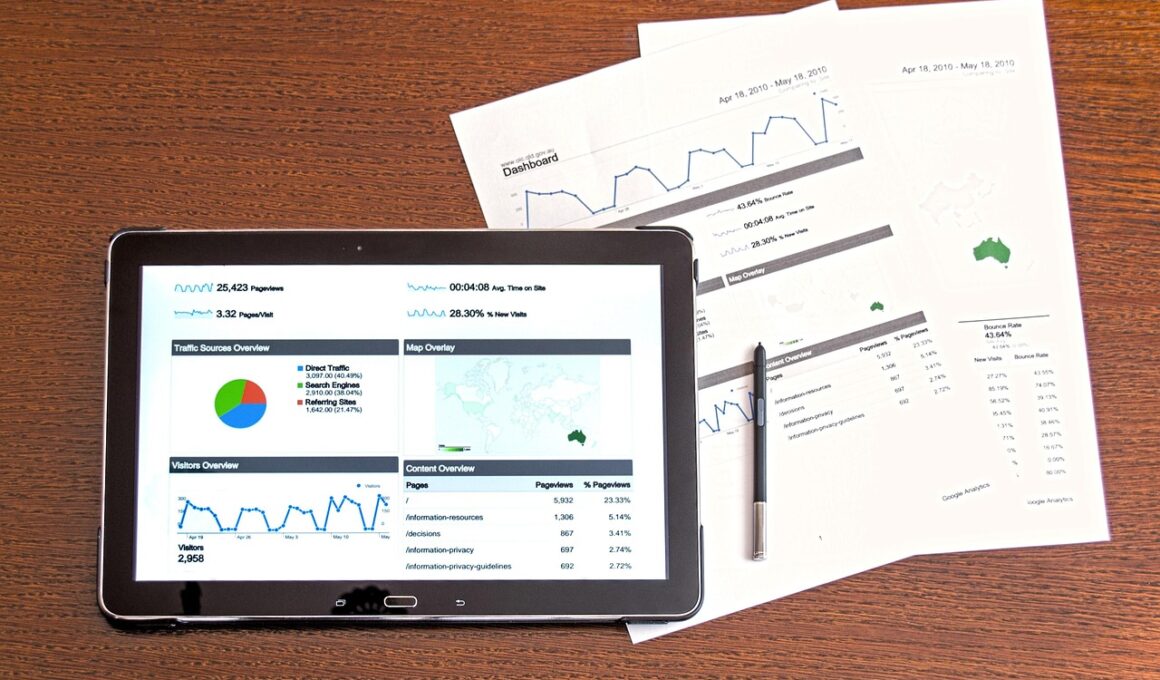Role of Marketing Analytics in Digital Transformation
In today’s fast-paced business environment, marketing analytics plays a pivotal role in driving digital transformation. As organizations embrace digital technologies, understanding customer behavior becomes critical. Marketing analytics provides insights into customer preferences, ensuring that companies can tailor their strategies effectively. With the right tools, businesses analyze massive datasets to predict trends and make data-driven decisions. These analytics help in optimizing campaigns, thereby increasing returns on investment (ROI). Marketing analytics enables brands to identify which channels perform best, allowing for better resource allocation. Furthermore, it empowers organizations to segment audiences and personalize interactions, significantly enhancing customer experiences. Understanding market dynamics through data enhances competitive advantages. Companies embarking on a digital transformation journey must leverage these insights to adapt quickly, innovate, and stay relevant. The integration of marketing analytics ensures that every action is informed by data, thus reducing risks associated with decision-making. This transformation is not just about using new technologies; it’s about reshaping the company’s entire approach to understanding and serving its customers. By harnessing these insights, businesses can create successful campaigns that resonate deeply with their audience, driving growth and customer loyalty.
In addition to understanding consumer behavior, marketing analytics contributes to the alignment of marketing efforts with organizational objectives. By implementing robust analytics frameworks, organizations can measure their marketing initiatives’ effectiveness and adjust accordingly. This ongoing evaluation process fosters agility in marketing strategies, allowing teams to pivot swiftly in response to real-time data. One critical aspect of marketing analytics is its ability to provide actionable insights into customer journeys. Companies can map out each stage of the customer journey, from awareness to purchase, identifying key touchpoints where engagement occurs. By analyzing these interactions, businesses can optimize communication strategies, improving conversion rates. Relevant tools, like predictive analytics, enable forecasting customer needs and behaviors, ensuring that offerings are timely and relevant. Furthermore, sentiment analysis technology helps decipher online conversations about brands, products, and competitors, providing invaluable feedback for strategy refinement. Content strategies also benefit significantly from analytics, ensuring that marketing messages resonate with target audiences. Ultimately, the synergy between marketing analytics and strategic planning lays the groundwork for sustained growth amidst digital upheaval. This integration fosters a culture of continuous improvement, critical for thriving in today’s dynamic market landscape.
Another essential element of marketing analytics is its capacity for enhancing customer engagement. Personalized marketing campaigns, guided by data-derived insights, resonate better with consumers, fostering loyalty. By effectively analyzing customer interactions across platforms, marketers understand the nuances of customer preferences. Such careful examination enables them to create targeted marketing campaigns that address specific audience needs. Additionally, employing techniques like A/B testing provides further clarity on which marketing variations work best. Marketers can experiment with different messages and formats, gathering performance data and learning what resonates with their audience. Moreover, monitoring social media metrics allows brands to engage in dialogue with their customers, thereby fostering community and increasing trust. This two-way communication stream enhances brand reputation, empowering customers to become advocates. Utilizing user-generated content further aids engagement, allowing customers to share their experiences, which can amplify marketing efforts significantly. Incorporating customer feedback into future strategies also reinforces a customer-centric approach. In essence, marketing analytics transforms the customer-brand relationship by facilitating meaningful interactions. These enhanced connections result in more effective messaging, which leads to greater customer retention and lifetime value. Companies that leverage these analytics tools can anticipate changes, enabling them to stay one step ahead.
Leveraging Data for Strategic Decision-Making
In marketing analytics, data-driven decision-making is a game changer for companies aiming for growth. By utilizing various data sources, businesses can gather deep insights into market trends and consumer behavior. This wealth of information enables marketers to make informed decisions about product launches, promotional strategies, and pricing adjustments. Analytics tools provide comprehensive dashboards, consolidating critical performance indicators into accessible formats. This clarity allows stakeholders to identify patterns and gaps in their strategies effectively. Moreover, advanced analytics techniques, such as machine learning and artificial intelligence, further enhance predictive capabilities. These tools can forecast future marketing performance based on historical data, equipping businesses with foresight. Analytics also support competitive analysis, allowing organizations to benchmark against rivals. Understanding competitor strategies helps in identifying unique selling propositions and creating differentiation in crowded markets. Additionally, data visualization techniques offer intuitive insights into complex data, facilitating quick understanding among team members and stakeholders. Marketers can share valuable findings across the organization, fostering collaboration and alignment. In this way, leveraging data promotes a proactive rather than reactive approach in marketing strategies, paving the way for sustainable growth in a digital-first world.
Another aspect where marketing analytics shines is in resource optimization. By analyzing various channels’ performance, organizations can allocate their budgets more efficiently, ensuring that marketing resources are used where they yield the highest returns. This focus on efficiency not only maximizes ROI but also minimizes wasted spending. For instance, insights gained from robust analytics might reveal underperforming campaigns that require adjustments or discontinuation. Furthermore, this analytical approach can uncover opportunities to reallocate funds towards more lucrative channels, enhancing overall strategy effectiveness. Additionally, through customer segmentation, analytics enables targeted investment in specific audiences more likely to convert, optimizing overall marketing spend. The granularity of audience data provides insights into demographics, interests, and behaviors, allowing for precision-targeted campaigns. This data-driven resource management approach leads to better conversion rates and, consequently, sales growth. Moreover, organizations can benefit from aligning marketing analytics with their sales teams, fostering a more integrated process. This alignment ensures that marketing initiatives are in sync with sales objectives, enhancing overall efficiency. Ultimately, efficient resource optimization through marketing analytics results in strategic investments that propel growth and strengthen competitive positioning.
The Impact of Marketing Analytics on ROI
Marketing analytics significantly influences return on investment (ROI), making it an essential aspect of any marketing strategy. By precisely measuring campaign effectiveness, organizations can ascertain which marketing efforts yield the best results. This data-driven transparency empowers marketers to justify their budgets to stakeholders. Armed with actionable insights, businesses can fine-tune strategies based on precise results, ensuring every dollar spent contributes meaningfully to profitability. Moreover, aggregating metrics from various campaigns provides a comprehensive view of overall marketing performance over time. This longitudinal analysis helps identify trends and growth opportunities that might otherwise go unnoticed. Additionally, effective use of analytical tools allows businesses to assess customer acquisition costs relative to lifetime value, establishing a clear picture of profitability per customer. Insights from marketing analytics enable better forecasting, equipping marketers with knowledge about future trends and customer behaviors. This foresight helps in proactive budgeting and campaign planning. Furthermore, organizations can leverage analytics to conduct competitive benchmarking, gaining insight into performance ratios compared to industry peers. This positioning strategy helps businesses identify areas for improvement, enhancing their chances of achieving higher ROI. In essence, marketing analytics is critical to maximizing returns and ensuring sustained business growth.
In summary, the role of marketing analytics in digital transformation is vital, as it fosters a culture of data-driven decision-making across organizations. Embracing analytics enables businesses to adapt to the ever-evolving market conditions, empowering them to innovate and respond quickly to customer feedback. As the digital landscape continues to expand, those leveraging marketing analytics will have a competitive edge. By understanding their audience deeply and crafting tailored experiences, organizations will not only increase customer satisfaction but also boost loyalty. Moreover, the integration of marketing analytics goes beyond traditional metrics, addressing the multifaceted challenges businesses face today. This approach ensures that marketing efforts align with broader organizational goals, ultimately driving growth and profitability. Additionally, as technology advances, so too do the capabilities of pricing, advertising, and customer insights that analytics tools offer, making them indispensable for strategizing. In closing, businesses prioritizing marketing analytics will be better positioned to thrive in the digital era. It propels a shift from reactive to proactive marketing strategies, fostering a deeper connection between brands and consumers. Ultimately, this journey into data-driven marketing is what sets the stage for successful digital transformation.
Successful digital transformation relies heavily on the tools, strategies, and insights provided by marketing analytics. By examining consumer data meticulously, companies are equipped to craft targeted marketing campaigns that not only resonate with audience but also reflect their needs. Those organizations that can harness the power of marketing analytics are more capable of adapting their strategies to meet evolving consumer preferences. As technology advances, so too does the complexity of data generated by customer interactions. This complexity necessitates robust analytics tools that can sift through vast amounts of information. Consequently, companies may understand not only their customers’ immediate needs but also their long-term preferences and behaviors. This foresight enhances customer relationships, ensuring that businesses can anticipate customer demands. With each new insight gained from marketing analytics, organizations become more adept at refining their offerings and maximizing customer satisfaction. Furthermore, effective collaboration between marketing and data analytics teams amplifies efforts, ensuring coherence in approach. Collaboration fosters a culture where data informs strategic decisions, enhancing accountability throughout the organization. Ultimately, embracing marketing analytics is not merely an option but a necessity for organizations keen on achieving transformative growth in the digital landscape.


